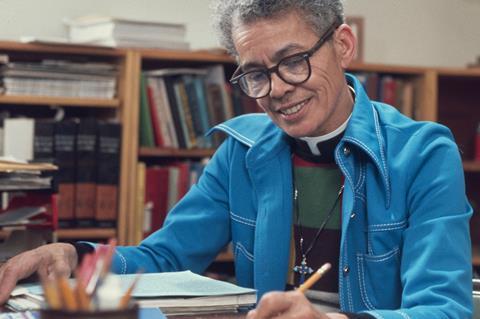A person far, far ahead of their time

Dirs: Betsy West, Julie Cohen. US. 2021. 91 mins
The team behind RBG (2018) does justice to another inspirational figure in My Name Is Pauli Murray. Betsy West and Julie Cohen’s fond, thoughtful tribute to the many lives of the trailblazing black activist, lawyer, queer pioneer, poet and priest will leave many viewers wondering why they have never previously heard the name. Those aware of Murray’s considerable achievements will appreciate the many fresh insights in a documentary destined to win hearts, minds and audiences.
Murray has for too long been overlooked by history
There is a whole history of America to be found in Murray’s multi-faceted life. A campaigner for equality, Murray poured her energies into becoming an agent for change. She fought segregation and injustice, championed black lives and feminist ideals and wrestled with her own gender fluidity. She was eternally ahead of the curve in confronting issues that seem more acutely relevant now, more than 35 years after her death.
It is a big life to condense into a 90-minute feature, a task made all the more daunting by the vast archive of material that Murray left behind. Mindful of posterity, she bequeathed her great niece 141 boxs of papers, letters and documents alongside video tapes and audio recordings of her autobiography. It is a dream resource for any filmmaker and one that is wisely deployed to create an elegantly engrossing discourse on her legacy.
Once described as a “one-woman civil rights movement”, Murray never saw herself as a helpless victim of prevailing attitudes and laws but always sought to find a way forward. Faced with legal impediments to equality, she became a crusading lawyer. Concerned that the highest official in the land was doing little to advance equality, she fired off tetchy missives to President Franklin Roosevelt, resulting in a lengthy friendship with Eleanor Roosevelt.
Potent archive footage provides context to a life that found a way to flourish in the shadows of lynch mobs, underfunded schooling for black children, the Great Depression and institutions that judged her inferior because of her colour and gender.
Among the impressive array of those interviewed are family members, friends, academics, some of her surviving students, biographer Rosalind Rosenberg, congresswoman Eleanor Holmes Norton and Ruth Bader Ginsburg. All of them add some texture and shading to a portrait in which there is always something further to discover.
It would be understandble if West and Cohen were blinded by admiration for their subject but they also acknowledge her mental health problems and a sometimes prickly personality. They address a lifelong anguish over gender. Beloved aunt Pauline called Murray “my boy/girl” and reached a deal with her that she could wear trousers during the week as long as she donned a dress to church services on Sunday. In her twenties, she easily passed as a boy to ride the rails and in later years sought medical advice on testosterone injections and confirming whether she had undescended testes.
The film reveals aspects of Murray’s private life that are less well known including a long relationship with “my silent partner” Irene Barlow. Following Barlow’s death she trained for the priesthood, eventually becoming the first black woman to be ordained in the Episcopal church
West and Cohen reflect some of Murray’s unassuming nature in a diligently assembled, absorbing film that treats its fascinating subject matter with respect. Detailing the way she challenged segregation on public transport long before Rosa Parks, argued the case around “separate but equal” long before Thurgood Marshall’s legal victory, and championed an equal rights amendment that informed the subsequent advances of Ruth Bader Ginsburg, they make a powerful case that Murray has for too long been overlooked by history.
Production companies: Participant, Drexler Film, Storyville
International sales: Participant garchuleta@participant.com
Producer: Talleah Bridges McMahon
Screenplay: Talleah Bridge McMahon, Julie Cohen, Cinque Northern, Betsy West
Editing: Cinque Northern
Cinematography: Claudia Raschke
Music: Jongnic Bontemps
















![[L-R]: Amanda Villavieja, Laia Casanovas, Yasmina Praderas](https://d1nslcd7m2225b.cloudfront.net/Pictures/274x183/6/4/1/1471641_pxl_20251224_103354743_618426_crop.jpg)








No comments yet